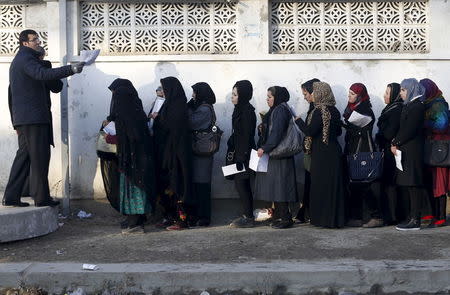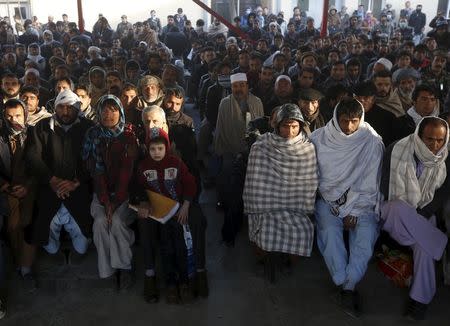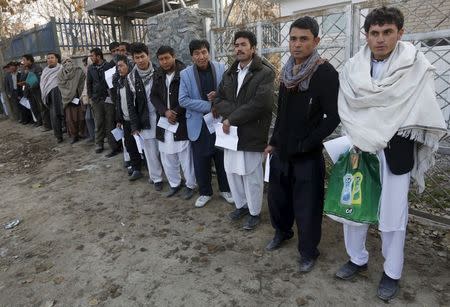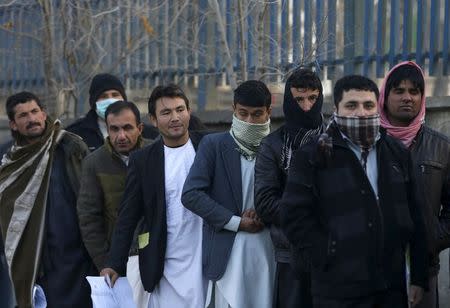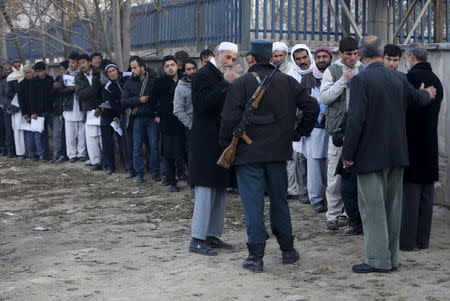Wave of young Afghan migrants seen hurting economy they leave behind
By Robert Birsel and Mirwais Harooni KABUL (Reuters) - Afghan software entrepreneur Farshid Ghyasi, chief executive of the Netlinks company, is struggling to keep his best employees, as more plan to join a wave of migrants leaving for Europe that risks causing long-term damage to the country and its economy. He is not alone in bemoaning the mass exodus, triggered by poor job prospects and worsening security as Taliban insurgents grow more powerful after the bulk of NATO troops withdrew at the end of 2014. Many of those going are young city dwellers who should be spending their productive years at home as their country struggles to emerge from war, and nearly 15 years of international support, to build a self-sustaining economy. "It's a huge loss," said Ahmed Siar Khoreishi, an economist and chief executive of Ghazanfar Bank. "The majority of these people are under the age of 30. This is really scary, we have very limited qualified, specialist people." There are no accurate figures for the number of Afghans who leave each year in search of a better life abroad, but more than 160,000 have gone to Europe this year, UNHCR data show. The majority of those have been in the last few months. "It's not necessarily everyone with master's degrees, but you have a large number of youth, the most dynamic, potentially productive strata of society, who are leaving," said Richard Danziger of the International Organization for Migration. The exodus has put pressure on the Afghan currency, the central bank says, but Khoreishi says that's not the problem. "The most important factor is the workforce. The brains are leaving," he said. A 30-year-old Kabul University law graduate seems typical of those heading off. "I know it isn't good for the country, but I've got my own life," said the man with a trim beard and Western clothes, who declined to be identified. He has a good job in a law firm but said he has been threatened because of an old job with NATO forces. He hopes to set off overland to Europe within days. "I know the difficulties I'll face, but it's a final decision." The government has urged young people to stay, but such calls ring hollow for many Afghans who know children of the elite are mostly abroad. President Ashraf Ghani said last week rich children who study overseas should pursue careers at home. "If they live abroad they become dishwashers. They don’t become part of the middle class," he told German broadcaster Deutsche Welle in an interview. "HOPE FOR THE FUTURE" While many take the overland route to Europe, some better-off Afghans fly out on visas to study or go to conferences and don't come back. Esmat Gulistani, director of a marble industry organisation, said his sector had been hit by the disappearance of up-and-coming professionals. "Those new managers were the hope for the future, not only of the industry but the country. They know computers, they know languages, they know the new system, how to do business," Gulistani said. "They are fleeing and that's really a problem. Replacement isn't impossible, but a very difficult and lengthy process." Gulistani said he regularly turns down people asking to go to trade shows abroad because he fears they will not return. Netlinks' Ghyasi said four employees had gone and another 20, including some of the best in his 160-strong workforce, were planning to go. He said he could only wish them luck. "Whoever gets an opportunity leaves," Ghyasi said in his Kabul office. With job opportunities withering as big aid projects are wound up, Ghyasi said he had no trouble finding replacements. "Twenty people going means 20 opportunities for new people." The government does not have reliable unemployment data but economists estimate the rate has risen to about 40 percent. One advantage of the departures, economists say, is that in future Afghans overseas are likely to send remittance payments back home, helping to stabilise the country's finances. The government was trying to stem the flow with a jobs programme and information campaigns, said Deputy Minister of Labour Ahmad Shah Salehi. "They should trust the government, they have to be patient," Salehi told Reuters. But for Kabul University student Nisar Ahmed, it was not trust, but a job in an up-market food shop paying $170 (£112) a month, that persuaded him to put off his departure, at least for now. "I was not sure about the future. No one knows what will happen tomorrow. But the most important reason is I was jobless," Ahmed said. "If I can't find good work, maybe I'll think again." (Editing by Mike Collett-White)

 Yahoo News
Yahoo News 